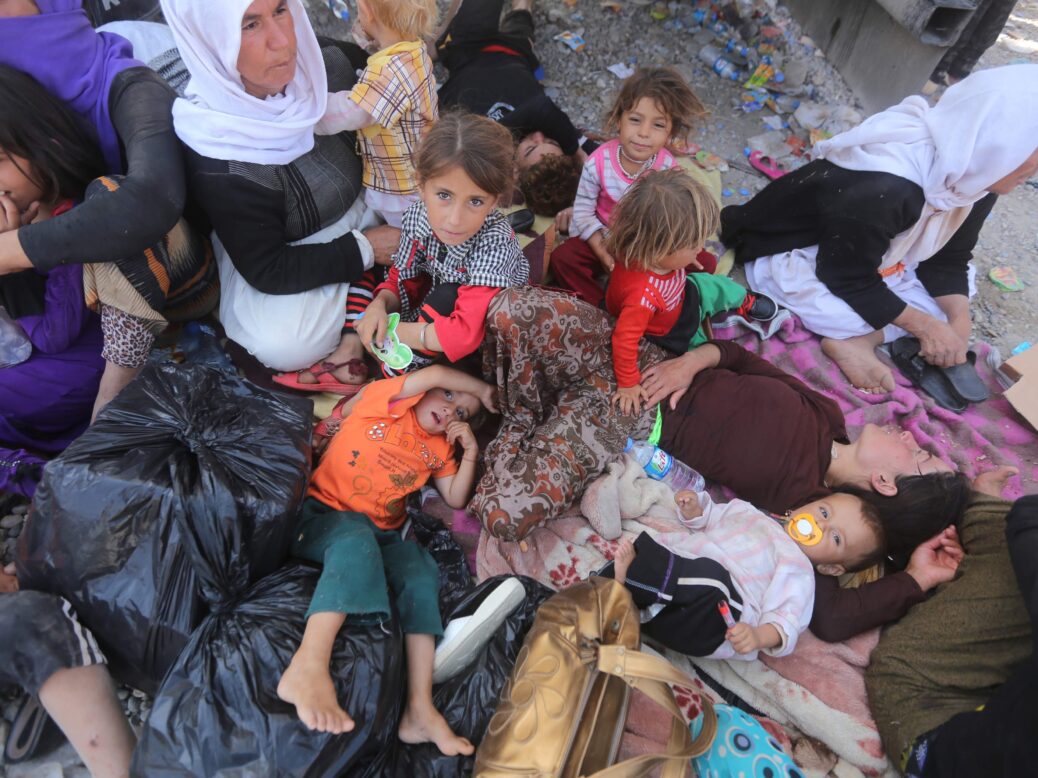
Since 3 August, over 200,000 residents of Sinjar have flooded into Dohuk, the westernmost governorate of Iraqi Kurdistan. Most of these refugees are Yazidis, fleeing the advance of Islamic State (also known as “Isis”) jihadists. By 9 August, the new arrivals had survived almost a week trapped in the mountains of Sinjar, with little food or water and without shelter from the sun. They have since taken up residence wherever they can: scores of families sleep on the floor in schools; old men sit inside empty shells of buildings still under construction; women and babies gather in circles on the floor of warehouses.
I have been told the harrowing stories of a family that walked with their ten children for three days across the desert; of a father whose 21-year-old daughter was shot by a jihadist when she ventured out to find water; of people who ate leaves or raw meat to survive; of a man airlifted out by a Kurdish-manned Iraqi government helicopter who watched as two other desperate men, clinging to the landing skids, fell to their deaths; of a Yazidi family, hidden by Arab Muslims until they could escape from the city by night.
Yet to some extent these refugees are lucky: many more Yazidis remain stuck in the mountains. Others could not flee; their villages were surrounded by Isis before they could escape. A number of people have told me that they are receiving calls from relatives trapped inside besieged villages. They are calling for one purpose: to inform their families that they will soon be killed for refusing to convert to Islam.
A man named Haider Elias Rasho told me he had just had a call from his daughter, trapped in their village, telling him that in the morning a two-day window to convert would expire. Another named Khalid Quto Khalaf had received a call from his brother-in-law bidding him farewell and saying he expected to be executed along with 500 other men imprisoned by the jihadists. Many people reported receiving similar phone calls.
On 17 July, Isis had given the Christians of Mosul – Iraq’s second city, which fell to the jihadist group in June – three options: convert to Islam, pay jizya (a head tax for non-Islamic “protected” minorities) or be killed “by the sword”. Rather than capitulate, many Christians fled the city, at which point Isis jihadists stripped them of all their belongings. They were not, however, killed.
This is no accident. Isis views Christians as “People of the Book”, an Islamic category for a few religions that, though seen as inferior to Islam, qualify for certain rights. The options offered to the Yazidis are fewer: as a faith group characterised by an oral tradition and marked by “pagan” and polytheistic elements, Yazidis cannot qualify for the designation, offered only to those who belong to monotheistic traditions that preceded Islam (Jews, Christians and Zoroastrians). To the jihadists, Yazidis must either embrace Islam or be killed.
The Yazidis are keenly aware that they are the targets of a genocidal impulse. After viewing the slaughter and dispossession of Sinjar, other Yazidi communities living south of Dohuk have started fleeing northward even if Isis has not yet breached defences near their villages.
The town of Shariya, south of Dohuk, saw its population grow from 17,000 to 80,000 in three days as refugees from Sinjar arrived. Then, on 7 August, the town emptied after fearful refugees and local people heard rumours that peshmerga defences were breaking. In the following days, the same refugees began returning to Shariya, having been unable to find accommodation elsewhere.
The Dohuk governorate is a whirlpool of movement as frightened minorities – and some Muslims as well – look for refuge. Many are moving in circles, from one town to the next and back again, unable to feel safe anywhere. The Kurdish regional government and NGOs are trying to bring food and water to towns overwhelmed by refugees but they are struggling to cope. It was at least easier to organise relief efforts when the refugees were concentrated in defined areas. Community leaders now say it is impossible to care for needy families when they are dispersed throughout the mountains and countryside.
This ongoing flight is driven by terror. Yazidi families no longer have confidence that the Kurdish peshmerga forces can protect them. Most welcome US aerial support for the local defensive efforts, though many do not understand why it is so limited in scope. Merely supporting the peshmerga is not enough; they will not be able to relax again until the Isis invaders have been driven from their country.



